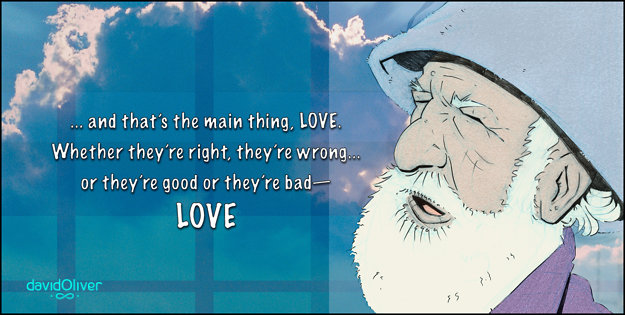
Everybody understands selfish love. I want this. I need that. Give me more. This is basic human nature. It's necessary to a degree. It helps us to preserve our bodies and take care of our basic necessities. But is that where it ends, with numero uno? Or is there something higher, more valuable, than selfish love?
Although the topic of love can seem very complex, I like to simplify it by dividing love into three main categories: selfish, mutual, and selfless. Let's examine each of them individually.
Selfish love is that love which is only concerned with personal interests. It seeks to fulfill desires by whatever means necessary, even at the expense of harm to others or to the environment. It considers itself to be of sole importance and doesn't give thought to how it impacts the world around. This is the lowest and most common type of love. Examples are all around us so I won't bother with detailing any here.
Mutual love is that love which seeks the fullfillment of personal desires but also makes allowance for others to fulfill their personal desires. Sometimes this takes the form of shop keeping as illustrated by the common adage, "I'll scratch your back if you scratch mine." It can be based on the understanding that, in certain situations, a mutual benefit must be present for either party to benefit. A higher form of mutual love rises from the belief that equality is a right common to all individuals. Everyone is equally entitled to fulfill their own personal desires. This type of belief will motivate allowances for others' pursuit of happiness even if it doesn't immediately or directly serve one's own self-interest.
The third and highest type of love is selfless love. Selfless love seeks only the happiness of others. One may naturally wonder how such a phenomenon can exist. How can one seek only the happiness of others while disregarding one's own happiness? The answer to this is actually somewhat paradoxical. Selfless loves is born from the belief that, on a deeper level, everyone is actually connected. The saints and mystics the world over have been telling us this truth for thousands of years. Philosophically, it can be explained in the following manner. The entire world, or universe, is a single unit. It's similiar to how our bodies can be considered single units. They have their multitude of parts, to be sure, but they're still single units, taken as a whole. If this view is accepted then it's not difficult to understand that what is good for the part is good for the whole. This is one way to understand the phenomenon of selfless love from a rational point of view.
The image above is a sketch of Stan. I like to call him Stan the man. I learned about him in a documentary called Off the Grid: Life on the Mesa. It's about a loose-knit community of radicals living in the desert, 25 miles from town, a million miles from mainstream society. Some of them are outlaws, some of them are just individuals clinging to their unique vision of the American dream.
Among the individuals living on the mesa was an elderly man named Stan. He lived simply, raising his own farm animals and working with his hands. His unique contribution, however, was that he would take in kids in need that wandered into the community. He'd give them food and shelter but only on the condition that they made themselves useful by helping out around the farm. He'd care for them and share his life's lessons with them. But he knew they wouldn't stay. After they regained their energy and raised their spirits they were off, perhaps never to be seen again. Stan knew this but helped them anyway, time and again. He must have had a deeper understanding of the connectivity and importance of all life. To me Stan is a great example of selfless love.
Click here to return to my home page.
Click here to subscribe to this blog.
